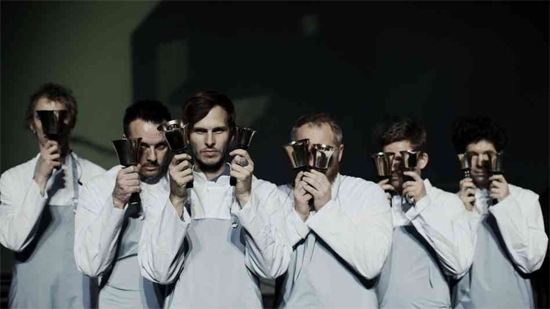Hendrik Weber isn’t the first artist to fuse classical and electronic music of course. While such explorations can often seem forced or clichéd, a futurist like Jeff Mills can turn a collaboration with the Montpellier Philharmonic Orchestra (Blue Potential) into a milestone of 21st century orchestral techno. At the same time, inspired as much by Mills as minimalists like Steve Reich, the German band Brandt Brauer Frick successfully recreate the electronic pulse of the Detroit instigators via an acoustic jazz ensemble. Pantha Du Prince’s collaboration with The Bell Laboratory inhabits a similar space to both, so there is an air of anticipation around the Queen Elizabeth Hall tonight to match the grandeur of the Berliner’s vision.
When he heard the sound of bells echoing from Oslo’s City Hall back in 2010, it must have seemed like a calling for this most atmospheric of techno producers. As far back as 2004, Weber had been using bell-like tones in his productions, helping mark him out within the minimal scene where he was often placed. He was always far too complex to be restricted by genres though, a fact alluded to in his biography: "Hendrik Weber once lived in the same woods that the Brothers Grimm fairy tales were based in, which perhaps explains the frequently strange and magical atmospheres to be found in much of his music."
Pantha Du Prince’s shimmering, glacial sound had seemingly reached its zenith by the time of his 2010 outing, Black Noise. That was until Hendrik heard the bells of the carillon pouring into the crisp Oslo air. His response was immediate, shipping one of the medieval three-tonne instruments from Norway to Berlin where he joined forces with The Bell Laboratory four-piece to create the sound that had been running through his mind for years. The resulting Elements of Light LP on Rough Trade has received fairly mixed press to date, though. While one critic applauded "Weber’s subtle mastery of momentum and energy" another complained of a tendency to "sour from zen-bound repetition to sheer tedium". It’s therefore interesting to see how the producer and ensemble rise to the challenge live.
A misting of dry ice fills the QEH before the show, in what is to be the first of two performances of the LP in full tonight. Walking slowly from the sides of the stage, Weber and his collaborators look every inch the sound scientists in their technician aprons. Studiously and meticulously they walk to the front of the stage ringing hand bells, sending the chimes through the QEH as if showering the crowd with shards of sound crystals. The effect is pure yet slightly foreboding. Peeling away to their bank of instruments, a long persistent drone fills the hall as the sound begins to swell. With the opening bell peals of ‘Wave’ easing seamlessly into ‘Particle’, the marimbas, vibraphones, and tubular bells of Heming Valebjørg and Håkon Stene create hypnotic and pulsating waves that wash against the rhythmic backbone of Weber’s production and Martin Langlie’s drums. Behind the electronic units of Weber and the sampler and percussion instruments of Bendik Hovik Kjeldsberg sit the towering bronze bells of the carillon with Laura Marie Olseng punching the keys of this most imposing of instruments with her back to the crowd. While the layers of sound that build through ‘Photon’ and ‘Spectral Split’ are both warm and enticing, drawing hollers from around the hall, there is also an ominous and eerie quality at work here tonight. This has much to do with the often discordant notes of the carillon, being worked by Olseng with an almost Giallo-like sense of suspense.
And it is this duality that ultimately makes Weber’s symphony a success, and one that is rewarded by a bank of smiling faces as the group walk through the crowd to the back of the Hall, ringing hand bells in a replication of the opening just under an hour before. As they return to a standing ovation for an encore of ‘Lay in a Shimmer’ from Black Noise, there is a sense that this marks only the beginning for Weber’s latest venture.


